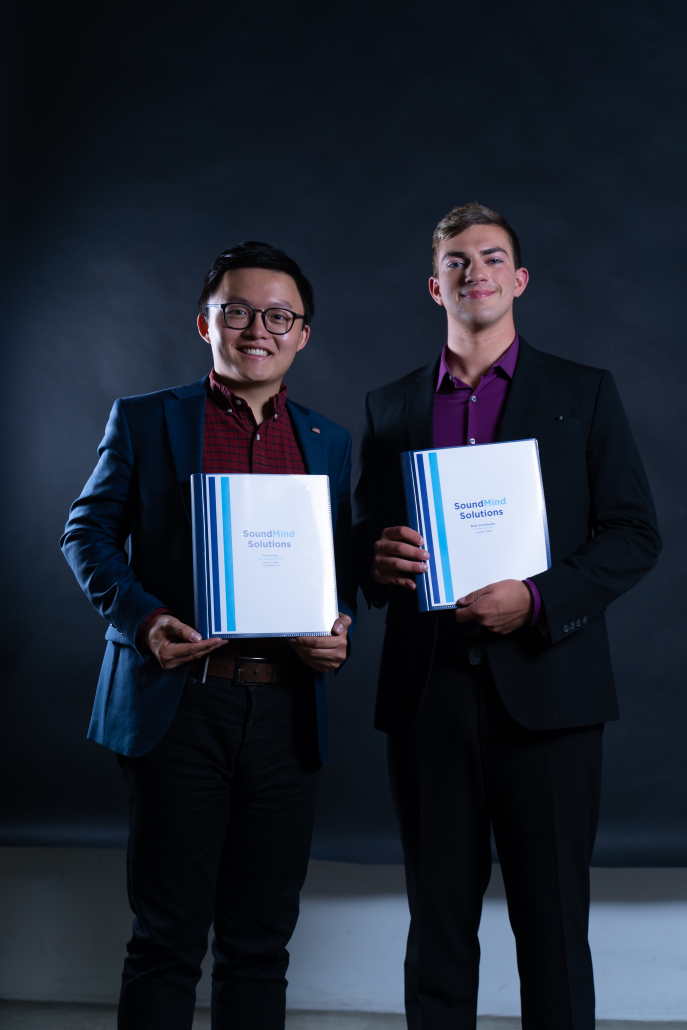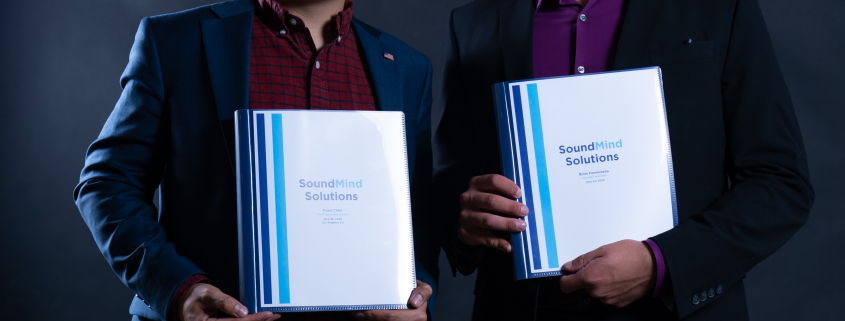Student-created music therapy app to help PTSD victims

Using individualized music therapy, SoundMind is an innovative application and Trojan-founded company that uses research-driven technology to provide mental health support to PTSD victims. The app’s beta version, launching in early 2021, will be first intended for frontline workers to help combat stress brought on by the coronavirus pandemic. The app will then expand in the second edition with more features and include more audiences such as military veterans and Black and Indigenous people and people of color.
Joining the military at 17, SoundMind CEO Brian Femminella witnessed firsthand the mental health difficulties that military personnel face. After one of his closest friends lost the majority of his memory after an accident training overseas, Femminella was inspired to help victims of traumatic brain injury and PTSD.
Following his service, Femminella started at USC in 2018, where he conducted research with Thornton School of Music professor Scott Spencer for two years. In their research, Femminella studied music therapy’s ability to counteract the symptoms of post-traumatic stress disorder and thanatosonics, the experiences that erase the boundary between sound and violence, publishing over three different studies.
In their studies, Spencer and Femminella focused on the idea of sound in battle and the lingering effects of sound in the form of PTSD. Experimenting with this idea, they tested the ROTC team’s 2-mile run performance to assess if their performance changed when listening to music while running. According to their findings, there was a significant increase in performance, proving their theory that music can have a beneficial impact on people in the military.
“After doing all of that work and hearing testimonials and seeing our close college friends go through an immense amount of stress and now with COVID, we decided to start the company,” said Femminella, a ROTC member and junior majoring in intelligence and cyber operations and political science. “I really chose to start the company on the grounds and the fact of, there’s now more time than ever where there’s anxiety, increased stress, depression.”
Founded in January by Femminella and current COO Travis Chen, the two were later joined by Jason Silberman, SoundMind’s chief product officer and app developer. In the company, Silberman focuses on iOS development, Chen directs the business end and Femminella oversees the entire operation and works on outreach.
“Brian and I are both — and Travis — all are very strong minded people and I think that works out really well because we’re both happily will tell each other that they’re wrong and are OK with being told we’re wrong and will then talk it out and come to a conclusion that we can all agree to,” said Silberman, a junior majoring in computer science/business administration, “and I think it works better that way because we all come from very different backgrounds and have differing opinions and expertises.”
Their team also includes juniors Andrew Clark, who is majoring in business administration, and Jonathan Joei, who is majoring in film and television production, who focus on marketing and media to spread SoundMind’s story.
According to Femminella, SoundMind differs from similar applications in that the software and interface design is individualized to the user. The biggest feature on the application is the composer, which, similar in concept to Tinder, allows users to swipe left and right on various soundscapes to filter through sounds and create an interactive, personalized experience. Sounds featured on the app include musical instruments such as piano or guitar with ambient noises playing in the background, such as birds chirping or wind flowing.
“If you don’t like one of those sounds, you could hold it and you could swipe it away, and if you don’t like the entire soundscape, you could shuffle it or if you love it, you can save it,” Femminella said. “So why is that different? Because it creates an individualized aspect to music that is missing from the market. It allows users to even have that little bit of interactivity.”
Femminella also said there will be a binaural beats visual section, which allows users to have different feelings such as relaxation or concentration depending on the different sound frequencies of the beats. The app will also feature games to exercise different brain functions to help those who struggle with memory recognition, depression or anxiety. Additional features include mood tracking using color schemes, a section for support groups and a rapid response button to contact loved ones and even 911 in an emergency.
Spencer noted that Femminella has embraced an inherently interdisciplinary approach, which has resulted in stable and structured success.
“Here is a project that is doing real, tangible good,” Spencer said. “This is what research should be trying to achieve — making the world a better place. Brian envisioned a project that could be a solid and logical step in tackling a much bigger problem.”
Chen said that the market for SoundMind’s work is undeniably substantial. According to the Anxiety and Depression Association of America, 47.7 million adults, about 21.6% of the U.S. population, are affected by PTSD or anxiety. In addition, 1.5 million Americans sustain a traumatic brain injury each year, according to the Centers for Disease Control and Prevention. According to a PR Newswire study, the total global market value of mental health applications is set to reach about $4 billion in 2027.
“Obviously COVID-19 has definitely shown that mental health is so, so important. Corporations are turning their heads and their priorities also into mental health resources for their employees and for their students at university levels,” said Chen, a senior majoring in international relations global business. “We really think that this is going to be an important space to enter into and all three of us on this call have personal stories of why we’re doing this.”
USC alumna Priya Rana Kapoor, who received her masters in marriage and family therapy and currently serves on the USC Alumni Association Board of Governors, met Chen and Femminella through their association with Society 53. Since then she has been a close mentor of the SoundMind team due to her previous experience at USC Keck Hospital’s neuroscience department.
“They have incredible passion for their app but also for helping this underrepresented or underserved community, and they really care about the product and what they’re going to put out into the world and how they’re going to help people,” Kapoor said. “And so that’s really what gets me.”

